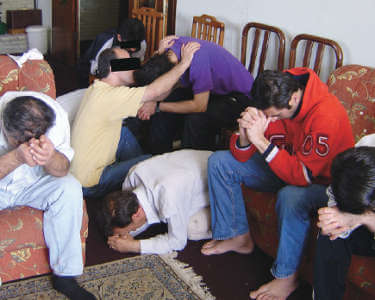
(Photo: Underground Christians in Iran)
Citing a BBC Persian news service report on Tuesday, United Kingdom-based Christian Solidarity Worldwide (CSW) announced on Friday that a member of Iran’s Legal and Judicial Committee of Parliament, Ali Shahrokhi, had told the Iranian state news agency (IRNA) of the decision to eliminate the mandatory death penalty amendment, which had drawn international protests.
The Parliamentary Committee had come under intense international pressure to drop clauses from the Islamic Penal Code Bill that allowed stoning and made death the mandatory punishment for apostates.
The new penal code was originally approved in September 2008 by a preliminary parliamentary vote of 196-7.
In Friday’s statement, CSW said that the bill must now pass through a final parliamentary vote before being sent to Iran’s most influential body, the Guardian Council, which will rule on it.
The council is made up of six conservative theologians appointed by Iran’s Supreme Leader and six jurists nominated by the judiciary and approved by Parliament. This body has the power to veto any bill it deems inconsistent with the constitution and Islamic law.
The Christian and Baha’i communities of Iran are most likely to be affected by this decision. Iran has been criticized for its treatment of Baha’is, Zoroastrians and Christians, who have all suffered under the current regime.
Joseph Grieboski, president of the Institute on Religion and Public Policy, said the timing of the announcement of the decision during protests over contested elections might not be coincidental.
“Were the regime to maintain [Iranian President Mahmoud] Ahmadinejad’s presidency then pass and enforce a restrictive penal code, the international pressure on Iran would be unbearable for the regime,” said Grieboski. “I do not consider it a sign of opening up. Instead, I see it as a sign of self-preservation.”
Security Backlash
Huge protests over the election results demonstrated considerable opposition to the Iranian government’s heavy-handed tactics, and although the official churches have taken no official stance, many Christians have supported the opposition, according to sources connected to social networking sites.
In the face of the massive protests, a spokesman for the foreign ministry, Hassan Qashqavi, released a statement condemning Western involvement in Iranian affairs and accusing the BBC and Voice of America networks of spreading “anarchy and vandalism.”
This passing of blame bodes ill for minorities in the country, including Christians, whom the Iranian government sees as pawns of the West; they could expect even harsher treatment in a feared post-election clamp-down.
“Since minorities, especially Baha’is and Christians, are often seen as fronts for the West, we can expect that they will feel the greatest backlash by the regime during the protests, and I would argue an even worse crackdown on them if Ahmadinejad and [Supreme Leader Ayatollah Ali] Khamenei come out of this,” said Grieboski.
An Iranian Christian who requested anonymity told Compass that both Christians and Iranians as a whole were tired of the dictatorial regime and asked for prayers for relief.
“The people are really tired, they have no hope, mentally, financially, spiritually, it is really difficult to live in Iran,” the source said. “You can’t have a private life, you can’t make a decision about what you believe, women can’t even decide what to wear. We just pray for the whole nation.“
The Iranian source was reticent to predict how the government might react to Christians following the elections but said that if there were a reaction, they could be among the first victims.
“So what the reaction of the government will be we can’t be 100 percent sure,” the source said, “but they could have a very radical reaction.”
Iranian Christians Maryam Rostampour, 27, and Marzieh Amirizadeh Esmaeilabad, 30, who were arrested on March 5 for their Christian activities, are still held in the notorious Evin Prison. The facility has drawn criticism for its human rights violations and executions in recent years.
Compass has learned that the women have been placed in solitary confinement.












































